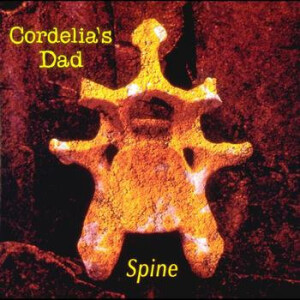 Cordelia’s Dad started as a punk band in the late 1980s, but within a few years was approaching older American songs and tunes with a punk-informed verve, energy and wit. The music they play, and their attitude toward it, places them squarely in the presence of such other greats of Western pop music as Bob Dylan, Dave Alvin, Fairport Convention, and Gram Parsons. All of these musicians and many more have used “folk” forms to illustrate the yin and yang, the darkness and light, of Anglo-American life.
Cordelia’s Dad started as a punk band in the late 1980s, but within a few years was approaching older American songs and tunes with a punk-informed verve, energy and wit. The music they play, and their attitude toward it, places them squarely in the presence of such other greats of Western pop music as Bob Dylan, Dave Alvin, Fairport Convention, and Gram Parsons. All of these musicians and many more have used “folk” forms to illustrate the yin and yang, the darkness and light, of Anglo-American life.
Spine is a mesmerizing collection of songs and tunes dredged from old songbooks, recordings and musicians in the U.S. and Canada, performed with an intensity that illuminates what is often a twisted heart of darkness underneath the shining American Dream.
The tracks on Spine range from “shape note” hymns to soldier songs, love songs to weary ballads of loss and pain. They’re played entirely on acoustic instruments, occasionally sung unaccompanied, and all recorded with great clarity and purity by Steve Albini, better known for his work with Nirvana, Robbie Fulks and other “alternative” rock and country acts.
The album opens with a thump of drum and dark chords of fiddle and accordion playing “Granite Mills,” a harrowing ballad of girls and women who died in a textile mill fire in the late 19th Century. The singer tells of watching the deaths of several young women, including one who tried to climb down a rope that broke and dropped her to her death. “I hope her soul has gone to rest in a place that’s dearer still … in heaven above far away from the burning mill.”
There are several other tracks of this sort on the album — more or less dark-textured early American numbers — including “Imaginary Trouble,” “Montcalm and Wolfe,” “Pilgrim” and “Three Babes.” The last is a dirge-like Appalachian ballad bravely sung without accompaniment by the group’s frontman Tim Eriksen, (who also plays guitar and banjo on other tracks). Eriksen and Cath Oss (who plays accordion and dulcimer) do most of the singing on Spine including a haunting duet on “Pilgrim,” an old English Baptist hymn.
Oss herself sings “Knife,” which band members in published interviews have said is their favorite on the album. It’s a slow piece, played on guitar, fiddle and drum. It starts out sounding like yet another of those bloody ballads of the “I killed my girl down by the river” sort, but actually is a bawdy song of two lovers and the blade they use to cut off his drawers because they’re too tight to pull off. The languid pace and Oss’ dreamy delivery bely the subject matter and emphasize the erotic nature of the lyrics in a way that no uptempo treatment of the song could possibly do.
“Spencer Rifle,” sung by Ericksen, is another ribald classic with many memorable lines, about a boy and girl caught making love by her mother. “He soon showed her what he could do/with his old Spencer Rifle,” pretty much sums it up.
The two shape note songs — “Wake Up,” and “Return Again” are moving and evocative examples of the genre, both from the current bible of the shape note movement, The Sacred Harp.
My favorites, though, are the instrumental numbers. The first of them, “Clyde Davenport Tunes,” features the nimble fiddle of Laura Risk on three old tunes, “Jenny in the Cotton Patch,” “Sally in the Garden,” and “Callahan,” and drummer Peter Irvine, who beats a tattoo on the fiddle’s strings with bamboo knitting needles. Eriksen plays a beautiful solo guitar tune, “In the Cars on the Long Island Railroad,” and a banjo-fiddle duet with Risk on “Abe’s Retreat,” a tune the group learned from West Virginian Dwight Diller, one of their mentors.
The album’s centerpiece is a suite of Quebecois reels featuring Risk’s fiddling and Irvine’s astonishing work on a “frame drum,” which Irvine explained is more or less a bhodran, but played differently.
“I strike the head with a stick or my right hand,” Irvine explained via email. “Meanwhile, the left hand presses against the back of the head. The different amount of pressure changes the pitch. Thus the different sounds, and the ‘timpani’ effect. The harder I press, the higher the sound.”
Spine is primal American music, performed passionately by an intense but fun-loving band. This is must listening for all lovers of American vernacular … oh hell, “folk” music.
Extended liner notes for Spine and much more information about the band are available at its Bandcamp page, and the band’s old website is available here.
(Appleseed Recordings, 1998)
